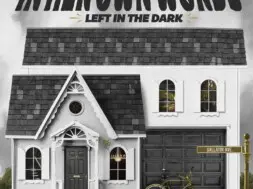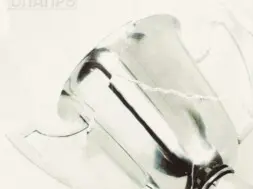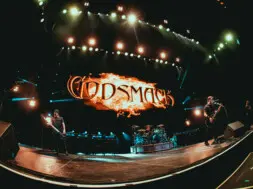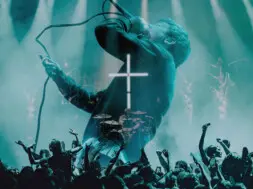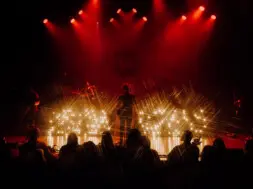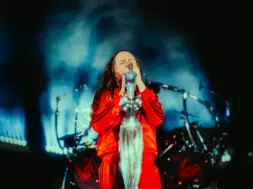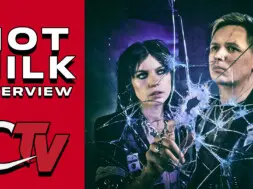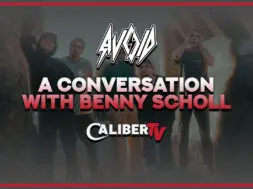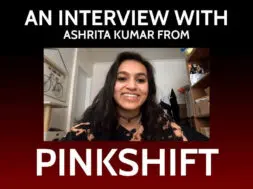
“We’re honest about how we’re feeling” – Josh Gilbert (Wovenwar) Interview
Hey, this is Matthew Powers and I’m here with Josh Gilbert from Wovenwar. How are you doing tonight, man?
Josh: Doing well, man! Just got done playing, just had some food and now I’m doing this interview! *laughs*
Sounds like a good night so far! So the new record is called “Honor Is Dead”. That’s such a bluntly dark title. Could you explain it to me?
Josh: It’s a title that Shane came up with. It’s a recurring theme throughout the record with how expectations can be let down. The title track set the tone for the rest of the record lyrically. That was one of the first songs that lyrics were written to, so that’s why we named the record that. We just thought that song was unique and a good representation of the sound we were going for on the record.
There’s a big contrast between the artwork and color scheme of the cover of the first record, the self-titled, and this record, “Honor Is Dead”. That goes just as well for the sound of each record. Why is that?
Josh: We worked with the same artist on this record as we did on the first record, Ryan Clark. He’s the singer of Demon Hunter. The first art that we had him work on, the wreath on Honor Is Dead’s cover, turned out amazing, but we felt like it was a little bright. So when we asked him if he could make it darker, that’s when he sent us over the broken chain and we thought it fit in perfectly with the lyrical theme. It seemed to sum up the vibe of the music as well. We didn’t set out to make a darker record, but on the first record I think we were still reeling from what had happened recently during the writing process and we wanted to separate ourselves a lot from what was going on. So we wrote these really optimistic lyrics and songs, and in a way that was therapy for us and a way to stay positive. But on this record we allowed ourselves to be pissed off and upset about what happened. We were honest about what was going on and those feelings rather than repressing them just for the sake of writing a positive record. We just wrote how we felt.
It’s the natural process of going through different emotions when we go through something like that.
Josh: Yeah, definitely. And we don’t look back and think “Oh wow, we messed up in doing that record too positively” because when I listen to that record I’m still proud of it. I think this one is, in a way, more honest because we didn’t filter those thoughts out. They’re all there for you to hear.
So, it’s a scary time in the world right now, specifically in our nation. I hear a frequent political theme on the record. Politics right now are something that’s very easy to be angry about. Was that supposed to be a recurring theme throughout the album?
Josh: Not necessarily. I want to say that there’s only one song that is very political and it’s “World On Fire”. It’s lamenting on the fact that facts don’t matter to people. It’s like people don’t care what the facts are, they care what they feel and they’re going to base their opinions off what they feel rather than what the facts tell them. On each side of the aisle, no matter who you’re going to vote for, it’s almost like people have already made up their minds before they see what the candidates even care about. It’s almost like they’re more concerned about an email issue than what is going to happen to our country if A or B gets elected. “Stones Thrown” is more about how the media pits sides against each other when really there shouldn’t be separate sides at all. “Lines In The Sand” is about the pitfalls of blind belief. And that song is specifically related to nationalism and how you could judge somebody’s character based on the country and the piece of the land that they’re born on. And to us, it’s something that you realize when you get older – Borders matter for economic reasons, but you can’t judge every occupant of a country or every human being living on the other side of an imaginary line just because it’s a different country. Everybody has the same types of desires in life. People want to be safe, secure, clothed, fed, you know, comfortable. People want to live their lives. It’s weird and really sad when those lines are defined by traditions such as growing up hearing and saying the Pledge of Allegiance all your life here in the US. To us, it’s a slippery slope when you start viewing your own country in a higher light than another country just based on where it’s located on a map.
That’s a great explanation. You’re right, it does seem like we’re focusing on petty things and the media wants us to do that so we’re blind to what’s really going on.
Josh: Exactly! And that’s kind of what “Stones Thrown” touches on. It’s about how the media can create a divide between people that may exist slightly but really emphasize it and make it worse. And I think in this election specifically, it’s really unfortunate that people almost don’t even care about the political issues that are at stake. They’re concerned with caring about whatever the media instructs them to care about.
That’s right. They really set the tone for how we’re going to feel about things or what we’re going to focus on. Speaking of tone, it sounds like you’re using some different bass tones on this record.
Josh: Yeah! I used the same bass to record most of the record as I did on the first Wovenwar record and all of the As I Lay Dying records, but what we experimented with was tunings. And inevitably, when you tune down an instrument, it loses some of the attack and brightness, but it sounds heavy, you know? The guitars are tuned a lot lower as well, so for me the bass on this record is a bit less present because we were trying to strip down the layers and make more of a record that was just heavier. We got a little carried away with the layers on the first Wovenwar record. Maybe not carried away, but there’s a lot of layering going on.
A lot of atmosphere.
Josh: Yeah! There’s a lot going on and on this record, I want to say that the writing process was a lot more impulsive. We got in a room and wrote. We didn’t spend a lot of time overthinking because we just didn’t have to.
I certainly hear a less-is-more kind of mentality being implemented.
Josh: Right! There’s less noodley leads just for the sake of having them. We asked ourselves “Does the part really need it, will it be better with it?” or are we just including it just so that X guitar player doesn’t get bored on stage? *laughs* I think that the bass tone is a little more subdued due to the guitar also being a little more subdued. But it’s also more distorted and a little nastier, I think.
Everything’s well-accented. When there’s a chorus, you hear a really soaring guitar melody behind it so that the chorus really shines. And when something needs to be heavy, you’re really kicking the listener in the teeth with your tone.
Josh: Yeah, we tried! I want you to always be able to hear it. That’s why my rule is if you listen for it, I want you to be able to hear it but I don’t want it to stick out too much. And there’s some songs like “The Tempest” on the first Wovenwar record where, and obviously I love this, the bass is so loud on that song. And of course I’m like “Yeah!” *laughs* But I listen back and I’m like “Maybe this is TOO loud..”.
As a bassist, the bass can never be too loud, right?
Josh: Exactly, exactly! *laughs*
So I see the direction Wovenwar is going and it’s interesting – On this Fury Tour, you’re with more metal bands and this new record, “Honor Is Dead”, really allows you to do that. But on the last record, you were with more active rock bands and I think it’s really cool that Wovenwar has that balance. Do you want to continue to have that or do you want to go heavier?
Josh: No, I think we like being a chameleon and being able to do a tour and play shows with Papa Roach or Black Label Society but then, at the same time, we like being able to go and tour with Unearth and Soilwork. We also went on tour with Atreyu, for instance. We’ve been able to do a big variety of tours, which is great. I think we’re just excited that we realistically fit into almost any metal or rock tour.
And that’s awesome. It shows how versatile everyone in this band is and the different musical directions you want to go. There’s different influences on “Honor Is Dead”, right? I hear more alternative directions on this album more than I do the typical As I Lay Dying-esque metal influences. Thrice, perhaps?
Josh: Yeah. Well, I wouldn’t say there’s specifically a Thrice influence musically, but Shane’s voice does share a lot of characteristics with Dustin’s, so I get when people say that. You aren’t the first. *laughs*
There’s a similar atmosphere in songs like “Compass”.
Josh: Yeah. We’d all be lying if we said we didn’t love (Thrice). Their new record is probably my favorite record of the year. It’s not on purpose, but I do hear it in Shane’s voice and his overall range is very similar to Dustin’s, I think.
Speaking of Shane, what’s it like working with him as a co-vocalist? I hear a lot more of you on this record than I did on the first one. There’s more harmonizing and there’s more of your voice in the choruses which is really cool.
Josh: Yeah, Shane and I work really well together. There’s no ego there. With the last record we said “Alright, we want people to know that Shane is the lead singer, so he’s singing this melody even if it’s a little out of his range”. We quickly found out that in the studio you have five or six tries to get it right. Live, you only get one try and if you’ve been on tour for three weeks it’s going to be tough to hit something that’s in the top two percent of your range. So we would switch out parts live. He would sing a lower part and I would sing his part. So on this record, instead of Shane doing it for the sake of doing it, I’d say, “Alright, if this melody sounds better in your range, then you’ll sing it.”. If it sounded better in my range then I’d sing it. For a song like “Censorship”, it didn’t even need harmonies because the melody was so strong. We tried harmonies and it took away from it, so we’d say “Alright, this is just going to be you Shane, for this whole song”.
There’s great chemistry there, obviously. It shows that you two know each other really well.
Josh: Thanks man! Then on a song like “Lines In The Sand” there’s a three-part harmony in the chorus, but the one that seemed the most epic was the note that I was singing so we made that the lead in the song. And it’s cool because when I see reviews people don’t really know that it’s not Shane. People think that it’s all Shane. *laughs*
You guys are just that in tune, I guess!
Josh: Well, I guess! Our voices just fit together well. His voice and my range mesh together for harmonies. I guess if you’re not super familiar with the band, our voices may be closer than I think. But when I hear it, I can easily tell it’s me but people, maybe not so much. But yeah, on this record I’m excited that I was able to contribute more on lead vocals.
I think everyone branched out more on this record. This is honestly, aside from any As I Lay Dying records, the most important record of all of your careers.
Josh: Thanks, dude! I appreciate that a lot.
No problem! So, what’s next for Wovenwar in the new year?
Josh: We’re going to tour. We don’t have anything confirmed quite yet, but next year we plan on touring the entire year.
Headliner coming up perhaps?
Josh: Maybe not a headliner just yet, but who knows? We’ll see how the record does.
Alright Josh, thank you so much for your time.
Josh: No problem, dude!


